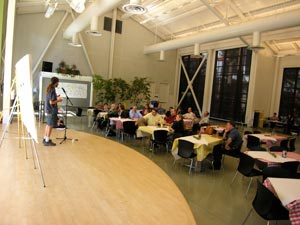There were tea and cookies, but this was no ordinary cafe.
Thursday afternoon, about 20 members of the campus community came together in the College 9/10 Multipurpose Room for University Cafe, a conversational process meant to bring various perspectives to the table, provoke thought, and create action in pursuit of common aims.
The idea is based on World Cafe, a methodology for hosting conversations about important questions. The World Cafe was born in 1995 during a two-day dialogue among a global, interdisciplinary group known as the Intellectual Capital Pioneers. Since then, it's been used by hundreds of groups, including large multinational corporations, small nonprofits, government offices, community-based organizations, and educational institutions.
World Cafe meetings had been happening at Kresge College since the fall, according to Mike Yamauchi-Gleason, college administrative officer for Porter and Kresge colleges. To signify that the gatherings are meant to be university-wide conversations, organizers decided to name the events University Café.
"We hope we can bring faculty, students, and staff together for intimate conversations," said Yamauchi-Gleason.
Thursday's meeting was the second such gathering in 2008. Organizers offered tea and cookies, and set up tables covered in jaunty gingham tablecloths, drawing paper, and pens. Participants included faculty, students, and leadership from Student Affairs and the Chancellor and Executive Vice Chancellor offices.
"What might be the value of conversations about things that matter among faculty, students, staff, and administrators on a regular basis?" asked Laurie McCann, campus ombuds, in one question designed to spark conversation among the groups of people at tables.
Respondents talked about the cafe being a way to bring new insights across campus, inspire communication, and safely argue and disagree.
The discussion then moved to how to make the conversations an ongoing part of campus life. Executive Vice Chancellor David Kliger suggested making them part of students' core course; others thought they should be based on popular topics or initiated by students.
While participants talked, graphic recorder Susan Kelly created an impromptu mural recording the participants' comments.
Contact the author at gwenm@ucsc.edu.



